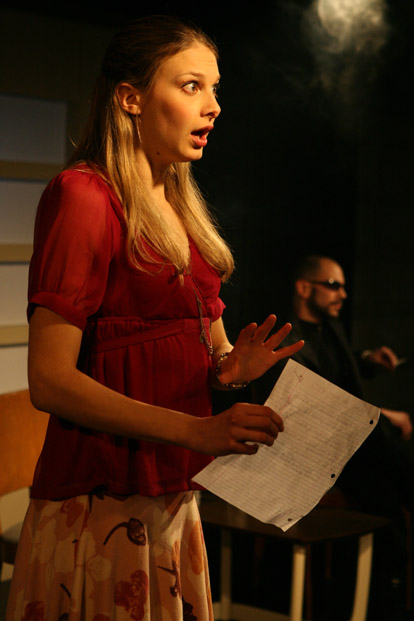In this week’s Wall Street Journal drama column, I review two small-scale New York shows, one on Broadway (The Story of My Life) and the second off-off (Itamar Moses’ Love/Stories). The first is a bore, the second a treat. Here’s an excerpt.
* * *
Broadway, like the rest of America, is feeling the financial crunch and looking for ways to weather it. This explains “The Story of My Life,” a new musical performed by a cast of two on a single set and accompanied by a nine-piece orchestra. Aside from being inexpensive to mount, “The Story of My Life” is sincere and sentimental, two commodities that have been known to draw a crowd. It’s also nicely staged and designed and features a charming star turn by Malcolm Gets, a performer of whom much more should be seen on Broadway. I only wish that all this, or any of it, made “The Story of My Life” worth seeing, but it’s an over-earnest dud.
Thomas and Alvin (Will Chase and Mr. Gets), the show’s two characters, are best buddies. Thomas is talented and ambitious, Alvin fey and Peter-Pannish. Thomas goes out into the big bad world and becomes a famous writer, while Alvin stays home to run his father’s bookstore and nurture what is pretty obviously an unrequited crush on his childhood friend. Thomas loses interest in Alvin, who responds by jumping off a bridge one snowy Christmas eve. Did I mention that Alvin and Thomas are both obsessed with “It’s a Wonderful Life”? Alas, no goofy angel shows up to intervene, and Thomas returns home to deliver Alvin’s eulogy. At first he finds it impossible to write, but Alvin’s ghost spends the evening telling him stories about their childhood, and the funeral takes place on schedule, complete with Heartfelt Tribute by Best Friend.
What we have here, in short, is a namby-pamby variation on “Merrily We Roll Along,” and Neil Bartram’s songs, which sound like sugar-sprinkled Sondheim, make the family resemblance clearer still. The trouble with Mr. Bartram’s score is that it has no edge at all–every song is nostalgic to a fault–and the trouble with Brian Hill’s book is that it’s static and surprise-free….
 One of the many things that I thought about to keep from nodding off during the second half of “The Story of My Life” was “The Four of Us,” Itamar Moses’ two-man play about a pair of struggling young writers whose friendship goes sour when one of them becomes successful. Mr. Moses is among the few playwrights who can write interestingly about writers and their work, a subject that is usually dramatic poison, and he’s done it again in “Love/Stories (or But You Will Get Used to It),” a program of five related one-act plays that is far better than its coy title.
One of the many things that I thought about to keep from nodding off during the second half of “The Story of My Life” was “The Four of Us,” Itamar Moses’ two-man play about a pair of struggling young writers whose friendship goes sour when one of them becomes successful. Mr. Moses is among the few playwrights who can write interestingly about writers and their work, a subject that is usually dramatic poison, and he’s done it again in “Love/Stories (or But You Will Get Used to It),” a program of five related one-act plays that is far better than its coy title.
The two central panels of “Love/Stories,” “Authorial Intent” and “Szinhaz,” are tales of romance gone wrong in which Mr. Moses plays Stoppard-style narrative tricks on the audience. “Authorial Intent” starts with a breakup scene, followed by a replay of the same scene in which the two characters analyze their lines instead of speaking them (“Objective: Change her mind. Tactic: Insist behavior is not a tactic designed to change her mind”). Then the lights go up and the actors, playing themselves, enact a “real-life” scene in which Character B (Michael Micalizzi) tries to pick up Character A (Laurel Holland) after the show. On paper this may sound too clever for its own good, but on stage it is amazingly effective–and very funny.
Even better is “Szinhaz,” in which Istvan Zoltan Andras (Felipe Bonilla), the director of a Russian theater company called “The Slow Death of the Human Soul,” takes questions from the audience, speaking through a translator (Maren Langdon) whose English is a bubble or two off plumb: “This company is now of course very much knowed about by peoples, but for very much time it was not knowed, or if it was, it was unliked, and not liked, which is what people were saying in the audiences, and in the critics, and also shouting in the streets at Istvan.” At first Mr. Moses plays the scene for laughs, but then he takes an unexpected swerve toward seriousness, and all at once you’re holding your breath….
* * *
Read the whole thing here.
Archives for February 20, 2009
TT: Almanac
“Any person who is truly observed is interesting, if only because he is unique. What makes Hollywood’s characters dull is that they are conventional types who are conventionally observed.”
Dwight Macdonald, “Kazanistan, Ingeland and Williams, Tenn.” (in On Movies)
